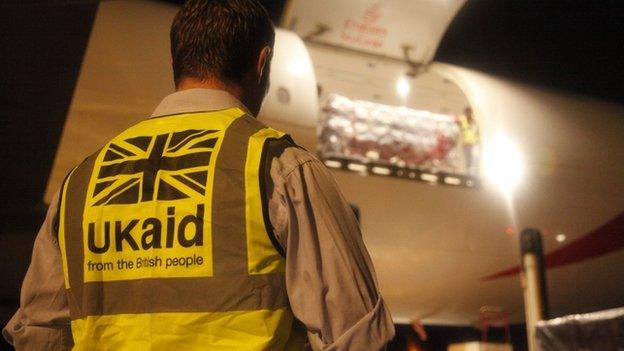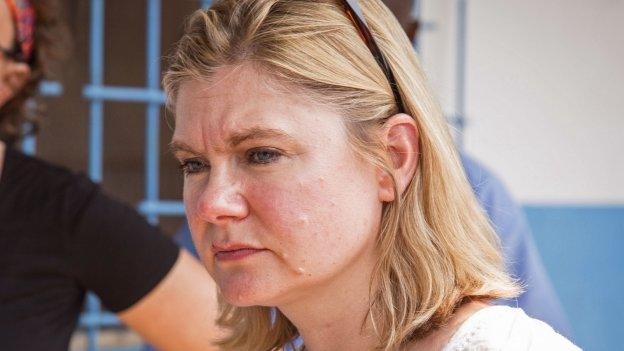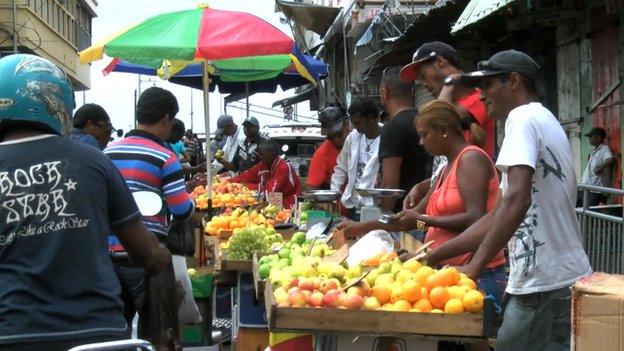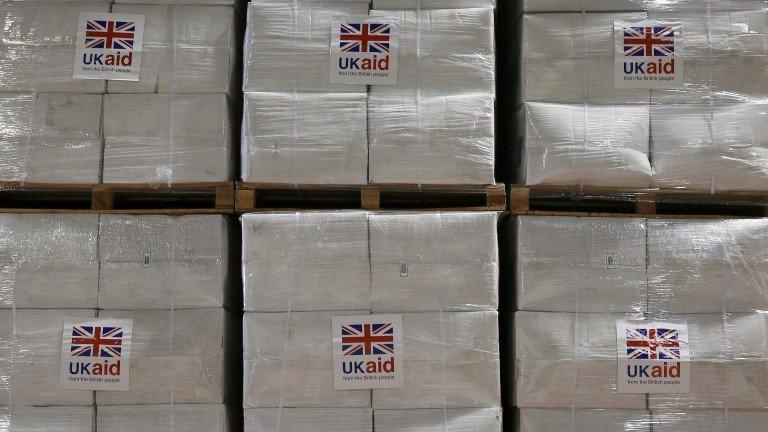What should the UK do about foreign aid?
- Published

UK is committed to spending on overseas aid
The UK is about to pass legislation committing it to ringfencing 0.7% of gross national income for international development spending. Prof Henrietta Moore, director of the Institute for Global Prosperity at University College London offers a personal perspective on the way forward.

What has been agreed?
The International Development (Official Development Assistance Target) Bill is on the cusp of becoming law.
It means that 0.7% of the UK's gross national income (GNI) will be ringfenced for international aid spending. The target will be legally binding on future governments.
This makes Britain the first nation in the G7 to honour a commitment agreed by the United Nations as far back as 1970.
In cash terms, it will mean spending around £12bn of taxpayers' money on development assistance in the current year.
The bill has had a rocky ride through both Houses of Parliament.
Proposed as a private member's bill by Liberal Democrat MP and former Scottish Secretary Michael Moore, some backbench Conservative MPs and Lords have been strongly opposed to the legal commitment.
However, their proposed amendments were defeated in votes.
The bill should receive Royal Assent in the coming days.

Is the current system flawed?
But while aid is certainly necessary in our deeply unequal world, not everything done in the name of aid is pure altruism.
There is an undoubted connection between the UK's aid budget and the promotion of British 'soft power'.
International Development Secretary Justine Greening has said herself that UK aid helps to fight the root causes of terrorism and it surely can't be coincidence that the single biggest recipient of UK aid is Pakistan.

Justine Greening is concerned about the use of some aid
And there is a commercial angle to the aid we give, as it is often delivered via partner companies that profit as a result.
In 2011-12, the Department for International Development (DFID) awarded 135 contracts to 58 contractors, worth almost £500m.
Beneficiaries included big-name firms such as PwC, Mott MacDonald and Adam Smith International.
And DFID's Food Retail Industry Challenge Fund (FRICH) has seen £1.9m in grants given to UK businesses including the supermarkets Waitrose and Sainsbury's to help get more African produce on to shop shelves.
So from the developing world's perspective, aid can sometimes seem like a way of cementing the established relationships between the rich 'global north' and the poor 'global south' - with a transfer of cash from the former to the latter, but within power structures that favour the former.
We also need to look at the wider context of aid. Often, the mainly agricultural economies of the 'global south' are struggling because of the inability to sell their products competitively to the rich world.
This situation is maintained through the colossal subsidy regimes maintained by wealthy nations to protect their own farmers: the European Union spends around €59bn a year on farm subsidies through the Common Agricultural Policy (CAP), with the US spending just over $30bn.
These subsidies, combined with trade tariffs, serve to block out competition from developing nations.

What should be the aim?
While aid will certainly be necessary for the foreseeable future to alleviate the extreme poverty that still sees one billion people globally having to survive on less than $1.25 a day, we should be looking to move to a point where it is no longer needed.
To do this, we need to radically rethink our economic, social and political models to create a sustainable, prosperous future for everyone on the planet.
These models will be different for different places, because there will be varying factors negatively impacting on people's individual and collective prosperity.
In a developed urban environment like London, for example, access to affordable housing might be the biggest pressure, while in rural Kenya it will be more basic things like access to clean and reliable water and electricity supplies.
But these models will be united by a fundamental re-evaluation of the concept of growth.
The continuous notching up of GDPs based on ever-rising consumption and carbon emissions across the globe simply isn't sustainable in a world with finite resources - especially when the UN predicts that we're hurtling towards a global population of 9.6 billion by 2050, while we're consuming resources at a rate that would need 1.5 earths to support.

Case study: Cogen for Africa:

New models of alternative pathways to sustainable development are already emerging.
Take the Cogen for Africa, external project - a successful example of so-called 'south to south co-operation' - helping food processing firms benefit from a big expansion of eco-friendly biomass energy in East Africa.
The technical expertise is being provided by the island nation of Mauritius, where over half of electricity is already generated by combined heat and power (CHP) plants.
Mauritius established a system of feed-in-tariffs to enable firms to sell back surplus electricity to the national grid.
The scheme has seen power plants set up in Kenya and Uganda which not only provide electricity to meet the needs of individual factories, but also enable owners to sell back green energy to the grid, replacing dirtier fossil fuel technologies.
Feed-in-tariffs have now been developed in Malawi, Tanzania and Uganda, and Ethiopia is also considering implementing a similar model.

What needs to be done?
These new models will mean learning lessons from around the world - many of which will come from communities on the front line in the fight against climate change.
Rich nations need to think beyond aid. They need to look at how the global trade system rigged in their favour is preventing poorer countries from lifting themselves out of poverty.
It's clear that developing nations regard this as key. Following the devastating 2004 Indian Ocean tsunami, for example, the Thai government made pleas to the EU and the US to reduce punitive tariffs on Thai shrimp exports, with the Thai prime minister saying this would make a bigger difference to his country's rebuilding efforts than aid money.
It also means involving business in rethinking its role in positive change. Ultimately, it is enterprise that will spread prosperity in the developing world and we need to foster the right conditions for firms to create social and environmental value.
Business has a responsibility to act sustainably - as many UK companies already do - but this will mean developing new models that recognise that simply replicating the old growth path of the rich world will only compound the pressure on resources and hasten climate catastrophe.

Listen to Prof Moore on the BBC programme Analysis.
- Published16 January 2015
